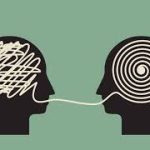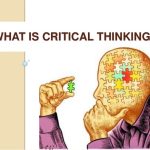One of the most important aspects of academic work is the ability to think critically about what you read, what you write and what you are told. Rather than accept all information as truth, you need to test the validity of others’ standpoints in order to arrive at your own point of view.

When you think critically, you are being active; you are not passively accepting everything you read and hear, but questioning, evaluating, making judgements, finding connections and categorising. Critical thinking is necessary in order to form judgements in lectures and tutorials; when reading and when writing assignments.
Critical Thinking is defined as the ability of putting forth an open-minded inquiry. It is one of the founding stones of human civilization. A person who lives his life bound by pre-conceived notions and doesn’t allow people to suggest changes is like a frog in a well. Open-mindedness broadens our horizon by allowing us to listen to different points-of-view and learning from each one of them.
Open-mindedness also means understanding the relevant evidence and basing an argument upon it, while also being responsive to accurate, positive criticisms. Open-minded people don’t mind having a second opinion from a credible source, even after they have arrived at a conclusion. They are always on the look-out for different alternatives and possibilities to approach a situation and don’t like being bogged down under the weight of preconceived ideas and notions.
It has been observed that people with critical thinking abilities are not so much interested in listening to the extent of the damage of the problem before setting to work upon addressing it. This means their approach to problem-solving remains the same for every problem they face. This is markedly different from those who don’t think critically, as their reasoning often gives way to emotional handling of things.
‘’Critical thinking is a process, the goal of which is to make reasonable decisions about what to believe and what to do. ‘’
‘’Critical thinking is evaluating whether we should be convinced that some claim is true or some argument is good, as well as formulating good arguments. ‘’


